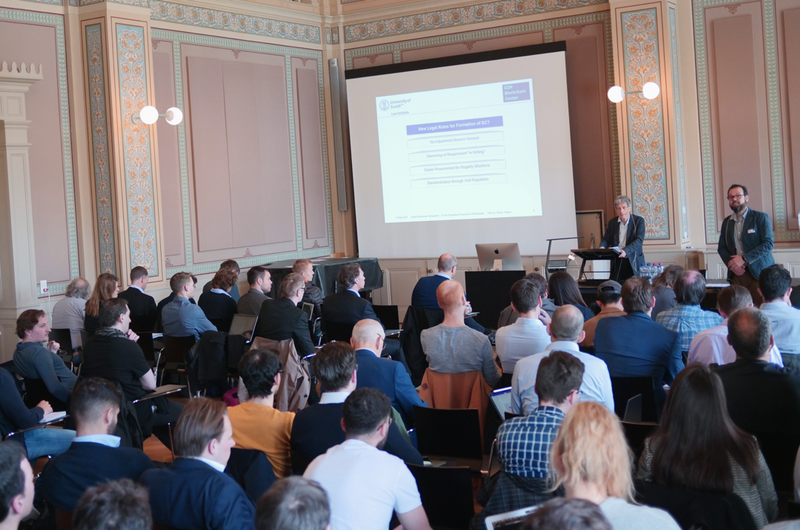
Why UZH for blockchain education?
The UZH CAS in Blockchain builds around the UZH Blockchain Center, the largest and most active Academic initiative in the space in Switzerland. With 20 Professors from the most diverse areas, the centre works as a single point of contact between scholars, industry and policy makers. It offers an extensive educational programme ranging from undergraduate students to industry leaders thanks to the unique combination of expertise and world-class research activities.
Based on a multidimensional analysis, in 2021, UZH was ranked first for blockchain Europe (and fourth World-wide) for blockchain by CoinDesk.
Course Goals
1. Assess the Technology
We provide a scientifically substantiated assessment of the full potential and limitations of blockchain technologies.
2. Understand the Implications
We discuss the most important economic and legal factors that determine the past evolution and current situation of blockchain-based systems.
3. Know the Trends
We not only enable an insight into state-of-the-art technologies but also identify the most important future developments in the area of blockchain.
4. Meet the Swiss Ecosystem
The programme is open and closed with Academic trips to flagship blockchain hubs in Switzerland.
UZH CAS in Blockchain
Our exclusive UZH Certificate of Advanced Studies (CAS) in Blockchain offers high quality education specially tailored to industry leaders. The course is taught by world-renowned professors across academic disciplines: Law, Informatics, Economics and Finance. This interdisciplinary approach is necessary to unveil the true potential of this emerging technology and is unique to our programme.
The current edition of the UZH CAS in Blockchain builds on three successful previous editions, starting in 2019. Its contents are yearly renovated following this rapidly varying field.
Query us early if you want receive more information and inscribe to the 2022 programme.
Course Facts
Blockchain is on everyone’s lips ‒ not least because the Crypto Valley stretching from Zug to Zurich is one of the global centres for this technology. But what is the story behind the new «Internet of Value»? What can this technology already do? What are its strengths, weaknesses, risks and areas of potential?
The CAS in Blockchain at the University of Zurich looks at these questions and in doing so addresses the topic at a uniquely wide-ranging level: computer scientists, lawyers, economists and financial specialists from the University of Zurich have joined forces to teach participants the technical basics as well as provide them with legal tools and economic knowledge about the applications. In doing so, they are able to call on first-hand experience from academic blockchain projects, consulting activities and company start-ups.
Target audience
Professional practitioners who want to receive an in-depth insight into the various facets of blockchain technologies and gain an edge in knowledge based on relevant research findings.
Course duration
Course days: September to December 2022, on Fridays and Saturdays
Project work: November – December 2022
Number of participants
Maximum of 30 participants.
Admission criteria
University degree at master’s level or an equivalent qualification as well as basic knowledge in the fields of IT, law and economics.
MAS in Quantitative Finance
Participants of the MAS in Quantitative Finance can book individual modules (worth 3 ECTS points each)
Degree
Every successful graduate receives a Certificate of Advanced Studies UZH in Blockchain (10 ECTS credits)
Venue
Center for Continuing Education of the University of Zurich, Schaffhauserstrasse 228, 8057 Zurich
Because of the current pandemic, online and on-site attendance will be allowed
Costs
CHF 8500.-, including course documentation
Structure
The study programme is divided into three modules:
- Blockchain Technology (3 ECTS credits)
- Blockchain Business and Economics (4 ECTS credits)
- Blockchain Regulation and Law (3 ECTS credits)
A total of 10 ECTS credits are required in order to successfully complete the CAS. An ECTS credit corresponds to a workload of around 30 hours. Each module is worth 3 or 4 ECTS credits. This comprises attendance time during the course days as well as preparatory and follow-up work.
Teaching language
Lessons are in English. The course documents are generally in English.
Process and assessment
An assessment must be completed for each module.
For the first module, this takes the form of a multiple-choice test on all topics covered in the module.
For the second module, two assessments will be performed during 08.10 and 09.10 sessions.
The third module is also assessed using a multiple-choice test as well as short essays on all topics covered in the module.
A final written paper (“assignments”) on a selected topic must be completed at the end of ghe course. Literature research as well as case studies, evaluations and practical studies are possible. Participants opt for a topic during the course of the module following consultation with a lecturer. The work should comprise approximately 15 pages and be written in either German or English.
Course Dates
Module 1:
– 09. September, 08:30 – 16:30
– 09. September, 18:00 – open end: Kick-off at CV Labs (Zug)
– 16. September, 08:00 – 16:30
– 23. September, 08:30 – 16:00
– 29. September, 16:00 – 17:00 (written exam)
Module 2:
– 30. September, 08:30 – 16:30
– 01. October, 08:30 – 16:30
– 07. October, 08:30 – 16:30
– 08. October, 08:30 – 16:30
Module 3:
– 14. October, 08:30 – 16:30
– 28. October, 08:30 – 16:30
– 29. October, 08:30 – 16:30
– 9. December, deadline assignment submission
– 19. December, 17:30 – open end: Graduation Ceremony and party at UniTurm
The course programme is structured under the following three modules:
Contents Module 1:
Blockchain Technology
1. Introduction to Blockchain
Lecturer:
Prof. Dr Burkhard Stiller
2. Blockchain Platforms and Architectures
Lecturers:
Prof. Dr. Burkhard Stiller &
Prof. Dr. Thomas Bocek
3. Smart Contracts
Lecturers:
Prof. Dr. Abraham Bernstein &
Dr. Daniele Dell‘Aglio
Contents Module 2:
Blockchain Business & Economics
1. Enterprise Blockchains
Lecturer:
Prof. Dr. Gerhard Schwabe
2. Cryptocurrencies
Lecturer:
Prof. Dr. Thorsten Hens
3. Blockchain Cryptoeconomics and Analytics
Lecturer:
Prof. Dr. Claudio J. Tessone
4. Applications of Public Blockchains
Lecturer:
Prof. Dr. Helmut Dietl
Contents Module 3:
Blockchain Regulation & Law
1. Token Regulation and ICOs
Lecturer:
Prof. Dr. Rolf H. Weber
2. Cryptocurrencies and Smart Contracts
Lecturers:
Prof. Dr. Rolf H. Weber &
Prof. Dr. Peter Georg Picht
3. Data Protection and Property Law
Lecturers:
Prof. Dr. Florent Thouvenin &
Prof. Dr. Alfred Früh









